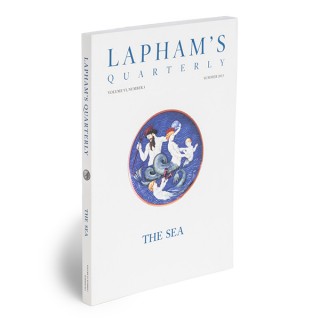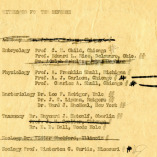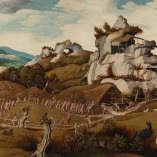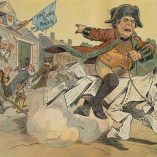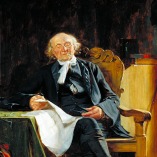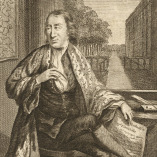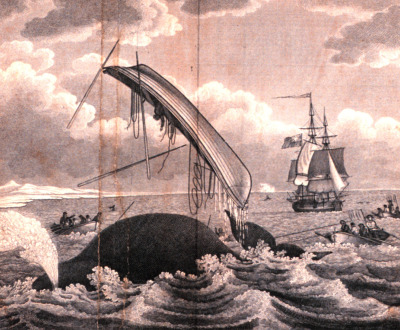
Dangers of the Whale Fishery, by William Scoresby, 1820. Wikimedia Commons.
“There’s something I find strangely moving about the ‘Extracts’ section of Moby Dick—before we even get into the text—by virtue of the attention that has been paid to the whale,” writer Wyatt Mason says in this episode of The World in Time. “It’s astonishing as you’re reading through. It’s proof of two kinds of life. It’s proof of the life of the creature itself. But it’s also proof of the life of the mind and the attention that we pay—meaning, we readers and we writers pay—through time to this creature, which is very different from the elephant because most of us never see one in our lifetimes. If we’re fortunate, we might, but for the most part, no. So they reside or they live in texts.”
With this episode, the second in an intermittent series on the literature, history, and science of the sea, The World in Time launches onto the waters of Moby Dick. The episode begins with excerpts from a pair of conversations Lewis Lapham recorded during his final years as host. First, Lapham speaks with Richard J. King about his 2019 book, Ahab’s Rolling Sea: A Natural History of Moby-Dick. In the second excerpted interview, recorded in 2022, Lapham talks with Aaron Sachs about Up From the Depths: Herman Melville, Lewis Mumford, and Rediscovery in Dark Times. The episode concludes with a new conversation. Wyatt Mason and Donovan Hohn talk about the first time they read Moby Dick, about teaching Melville’s novel to incarcerated students enrolled in the Bard Prison Initiative, and then, like a pair of sub-sub-librarians, they swim through two curious documents, “Etymologies” and “Extracts,” that precede the famous first sentence of Melville’s tragic Leviathan American novel.
WORKS CITED
[In Order of Mention]
Herman Melville. Moby-Dick: A Norton Critical Edition. Edited by Hershel Parker. New York: W.W. Norton, 2017.
Lapham’s Quarterly, Summer 2013: The Sea.
Richard J. King. Ahab’s Rolling Sea: A Natural History of Moby-Dick. Chicago: University of Chicago Press, 2021.
Aaron Sachs. Up From the Depths: Herman Melville, Lewis Mumford, and Rediscovery in Dark Times. Princeton: Princeton University Press, 2024.
Richard J. King. Sailing Alone: A Surprising History of Isolation and Survival at Sea. New York: Viking, 2024.
Charles Darwin. The Origin of Species. Introduced by Sir Julian Huxley. New York: Signet, 2003.
Herman Melville. White-Jacket; or, the World in a Man-Of-War. New York: United States Book Company, 1892.
Thomas Beale. The Natural History of the Sperm Whale. London: J. Van Voorst, 1839.
Samuel Taylor Coleridge. The Rime of the Ancient Mariner. Introduced by Ned Halley. New York: Macmillan, 2017.
Aaron Sachs. The Humboldt Current: Nineteenth-Century Exploration and the Roots of American Environmentalism. New York: Penguin, 2007.
Aaron Sachs. Stay Cool: Why Dark Comedy Matters in the Fight Against Climate Change. New York: New York University Press, 2023.
Lewis Mumford. Herman Melville. New York: The Literary Guild of America, 1929.
Wyatt Mason. “The Danger Artist,” GQ, December 2011.
Arthur Rimbaud. Rimbaud Complete. Translated and edited by Wyatt Mason. New York: Modern Library, 2003.
Arthur Rimbaud. I Promise to Be Good: The Letters of Arthur Rimbaud. Translated by Wyatt Mason. New York: Modern Library, 2004.
Donovan Hohn. “Episode 3: Francine Prose.” The World in Time from Lapham’s Quarterly, June 20, 2025.
Michel de Montaigne. The Complete Works of Michel de Montaigne. Translated by Donald M. Frame. Introduced by Stuart Hampshire. New York: Everyman’s Library, 2003.
Ralph Waldo Emerson. The Essential Writings of Ralph Waldo Emerson. Edited by Brooks Atkinson. Introduced by Mary Oliver. New York: Modern Library, 2000.
Marcus Tullius Cicero. Cicero: Selected Works. Translated and introduced by Michael Grant. New York: Penguin Classics, 1960.
David Foster Wallace. Infinite Jest. New York: Back Bay Books, 2006.
Donovan Hohn. “Episode 5: Ben Tarnoff and John Jeremiah Sullivan.” The World in Time from Lapham’s Quarterly, July 4, 2025.
Guy Davenport. The Geography of the Imagination: Forty Essays. Introduced by John Jeremiah Sullivan. Jaffrey, NH: Nonpareil Books, 2024.
Charles Dickens. Great Expectations. Edited by Charlotte Mitchell. New York: Penguin Classics, 2002.
Fyodor Dostoevsky. Crime and Punishment. Translated by Richard Pavear and Larissa Volokhonsky. New York: Vintage, 1993.
John Milton. Paradise Lost. Edited by John Leonard. New York: Penguin Classics, 2003.
Charles Baxter. The Art of Subtext: Beyond Plot. Minneapolis: Graywolf Press, 2007.
Rattawut Lapcharoensap. Sightseeing. New York: Grove, 2006.
Donovan Hohn. Moby-Duck: The True Story of 28,800 Bath Toys Lost at Sea and of the Oceanographers, Environmentalists, Beachcombers, and Fools, Including the Author, Who Went in Search of Them. New York: Penguin, 2012.
The Bible: Authorized King James Version with Apocrypha. Edited by Robert Carroll and Stephen Prickett. Oxford: Oxford University Press, 2008.
Buster Keaton, dir. Steamboat Bill, Jr.. United Artists, 1928.
Kat Eschner. “The Real-Life Whale That Gave Moby Dick His Name,” Smithsonian Magazine, October 18, 2017.
William Shakespeare. A Midsummer Night’s Dream. Edited by Barbara A. Mowat and Paul Werstine. New York: Simon & Schuster, 2004.
Edmund Spenser. The Faerie Queene. New York: Penguin Classics, 1979.
William Scoresby. An account of the Arctic regions with a history and description of the northern whale-fishery. Edinburgh: Archibald Constable and Co., 1820.
Alexander Pope. The Rape of the Lock. Garden City, NY: Dover Publications, 1968.
Charles Lamb. “The Triumph of the Whale.” In The Works of Charles and Mary Lamb: Volume 4. Project Gutenberg.
William Shakespeare. Hamlet. Edited by Barbara A. Mowat and Paul Werstine. New York: Simon & Schuster, 2003.
George William Manby. Journal of a Voyage to Greenland, in the Year 1821. London: G. and W.B. Whittaker, 1823.
